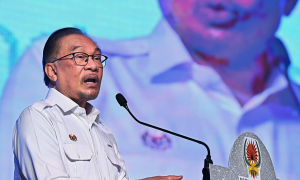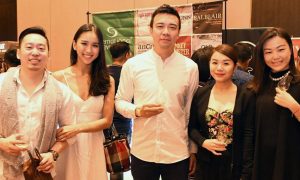BEN DREWE MOVED TO MALAYSIA MORE THAN 20 YEARS AGO. AMY DE KANTER FINDS HE HAS SPENT MOST OF THAT TIME LEARNING AND SHARING THE HEALING SECRETS OF MALAYSIA’S RAINFOREST.
.jpg) Ben Drewe grew up in a nice part of Sydney. “I had long blond hair, I was a beach bum…” he reminisces. No one could have guessed that he would be one of the few who very early on finds his life’s calling.
Ben Drewe grew up in a nice part of Sydney. “I had long blond hair, I was a beach bum…” he reminisces. No one could have guessed that he would be one of the few who very early on finds his life’s calling.
“When I was 16 my family moved to an organic farm. I was put in charge of watering the herb garden and taking care of them.” Within a year, he had set up an herbal laboratory in the shed, and had started making herbal remedies. “I read every book [on the subject] I could lay my hands on.”
Human patients were wary (“They wouldn’t let me near them!”) but the teenager became quite successful at treating animals and local farmers would seek him out. He likely would have done well staying in Australia, but Ben’s interests had expanded: “I fell in love with all things Asian.”
He spent three years in India, absorbing all he could about the culture, including yoga, Indian healing and Ayurvedic medicine. He was a frequent visitor to Malaysia during this time. Not only was Malaysia a stop off point between India and Australia, but whenever he fell ill in India he would also come here to recuperate. Once again, Ben fell in love, this time with Malaysia, and soon made this his new home.
RUNNING WITH BORNEO’S HEAD-HUNTED
In 1989, Ben heard of Western Herbal degree being offered in KL. He took the course, graduated and apprenticed himself to a British expat herbalist, who ran The Natural Harmony centre. Customers did not know what to make of him. “I was in my 20s but I looked 18,” Ben says. In the meantime, he was taking every course he could in Chinese medicine, but the more he learned and the more overlap he saw between cultures, the more he wanted to
learn. Ben’s curiosity would lead to him to years of going into jungles and villages to spend time with Malaysia’s indigenous tribes as well as with Malays who still practiced the folk medicine.
Ben says the highlight of his expeditions was the month he spent in Borneo with the Penans, the last semi-nomadic
tribe in Malaysia. “The Penans don’t have to remember what their grandparents used. They still rely on herbs for everything.”
Hunting with the Penans was particularly interesting: “They are running barefoot through the forest and are shooting straight up in the air, 12 o’clock,” he says, demonstrating. It was worrying enough that some animal would come crashing down on them, “I asked, what happens if they miss and the dart comes down? What is the antidote?”
There was an antidote of course, but the tribe had to hold a long meeting before deciding to reveal this particular secret to their friend. For generations, the gentle Penans had shared the forest with a much more violent tribe, the Ibans. Historically, “for an Iban to become a warrior, he had to find a Penan and come back with his head,” explains Ben. Their poisonous darts were the Penans’ best defence and Ben still seems humbled by the honour
of being the first outsider to be entrusted with their secret. Even if Ben wanted to share it, he says, “the antidote has no botanical name.”
BOTTLING IT UP
Ben has not only seen firsthand the healing power of traditional herbs, as an ethno botanist, he has studied it. He knows what herbs are good for malaria, what should be taken after childbirth but not when trying to conceive. He can tell you age old secrets to beautiful hair and naturally soft skin. He can recommend something you can take if you are going out drinking but don’t want to get drunk. His slimming coffee contains an ingredient used in the
Kalahari Desert to take away appetite and get energy. He can tell you the name of the one oil that does not change when you heat it, keeping its healing properties which include increasing metabolism, helping with digestive disorders, boosting energy and serving as an anti-viral, antifungal and anti-bacterial.
In 1995, Ben registered Rainforest Herbs, a range of products for the international market so more could benefit from what he has learned. He practices ethical gathering and growing; all his herbs are collected from secondary rainforests. His commitment to protecting the environment that gives so much predates his introduction to Borneo’s jungles. “Mum was a nature lover,” says Ben. “She used to take us to small pockets of remaining rainforest in Australia with tears in her eyes.” It is finally common knowledge that the preserving the rainforests is vital to our survival, but as Ben has found, these contain treasures more precious than we know.
For more information about Rainforest Herbs, visit www.rainforestherbs.com.
Source: This article appeared in The Expat during the year 2010
Get your free subscription and free delivery of The Expat Magazine.
This article has been edited for ExpatGoMalaysia.com
"ExpatGo welcomes and encourages comments, input, and divergent opinions. However, we kindly request that you use suitable language in your comments, and refrain from any sort of personal attack, hate speech, or disparaging rhetoric. Comments not in line with this are subject to removal from the site. "



















